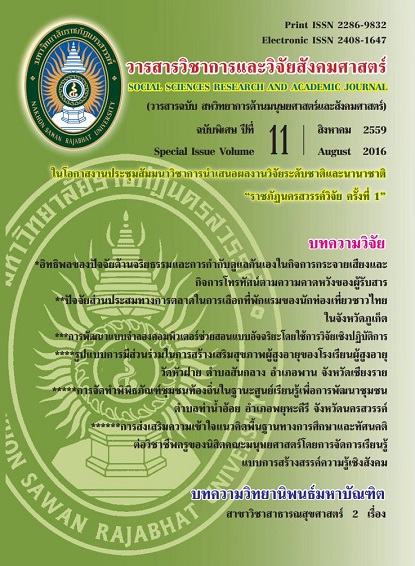การจัดทำพิพิธภัณฑ์ชุมชนท้องถิ่นในฐานะศูนย์เรียนรู้เพื่อการพัฒนาชุมชนตำบลท่าน้ำอ้อย อำเภอพยุหะคีรี จังหวัดนครสวรรค์; The Local museum as a learning center for community development: The case study on Tha Nam Oi community Phayuha Khiri district Nakhon s
Main Article Content
Abstract
บทคัดย่อ
บทความวิจัยนี้ มุ่งศึกษาศักยภาพในการพัฒนาพิพิธภัณฑ์ชุมชนท้องถิ่นตำบลท่าน้ำอ้อย อำเภอพยุหะคีรี จังหวัดนครสวรรค์โดยการสำรวจสืบค้นความหมาย ประวัติความเป็นมา วัตถุทางวัฒนธรรมชุมชน จัดทำบัญชีและฐานข้อมูลของวัตถุทางวัฒนธรรมชุมชนและวิเคราะห์ศักยภาพในการดำเนินการด้านการจัดการพิพิธภัณฑ์ชุมชนในฐานะของการเป็นศูนย์การเรียนรู้ทางสังคม โดยการมีส่วนร่วมของชุมชน เก็บข้อมูลโดยการสัมภาษณ์จากผู้ให้ข้อมูลหลัก การสนทนากลุ่มและวิเคราะห์ โดยเรียบเรียงในเชิงพรรณนา ผลการศึกษาพบว่า ชุมชนท่าน้ำอ้อยมีศักยภาพในการดำเนินการด้านการจัดการพิพิธภัณฑ์ชุมชนในฐานะของการเป็นศูนย์การเรียนรู้ทางสังคม โดยการมีส่วนร่วมของชุมชนทั้งการจัดหาวัตถุทางวัฒนธรรม การจัดทำบัญชี การสืบค้น และการจัดแสดง โดยเกิดจากเงื่อนไขสำคัญ 3 ประการ คือ (1) ความภาคภูมิใจในท้องถิ่นของตนในฐานะที่เป็นส่วนหนึ่งของประวัติศาสตร์อารยธรรมชาติ (2) การบริหารจัดการโดยการมีส่วนร่วมของคนในชุมชนและองค์การต่างๆ ทั้งหน่วยงานราชการและองค์การปกครองส่วนท้องถิ่น มีการถ่ายทอดและเรียนรู้ร่วมกันระหว่างคนในท้องถิ่นเองและกับคนนอกท้องถิ่น และ (3) มีการกำหนดหลักการและแนวปฏิบัติที่ชัดเจน
Abstract
The aims of this Research was to study on the potential development of community museum in Tha Nam Aoy sub-district Phayuha Khiri district Nakhon sawan province. Information retrieval by exploring and Interpretation on cultural materials, accounting database of cultural materials and analyzed the potential in the management of community museum as a learning center for community development. Data were collected by interviews of key informants (Key-Informant), group discussion, analysis and descriptive presentation. The study found that The Tha Nam Aoy community had the potential operation management of community museum as was the center for social learning by three factors: 1) pride in their As a part of the national history 2) managed by the participation of the community and various organizations Both the government and local authorities and learned together between the local people and outsiders 3) determination principle and practice was obvious


